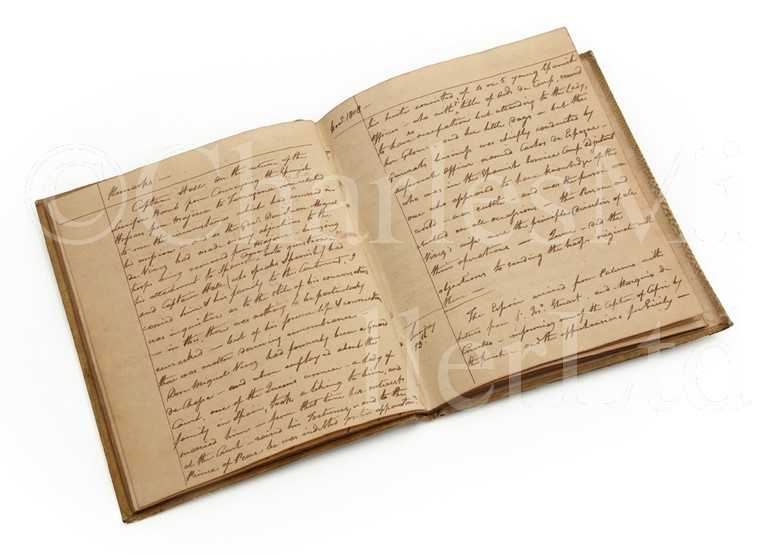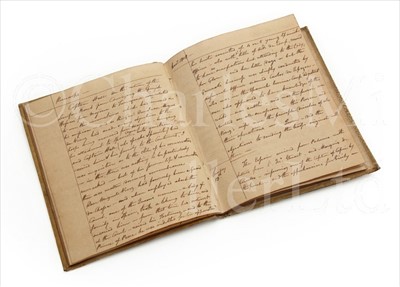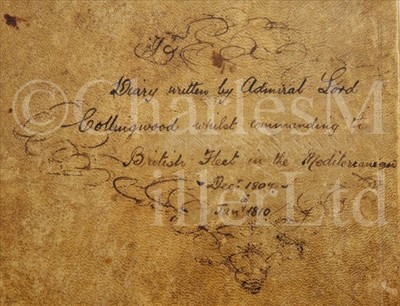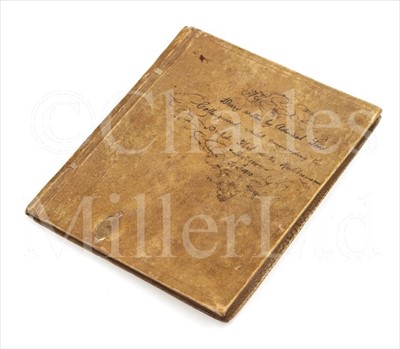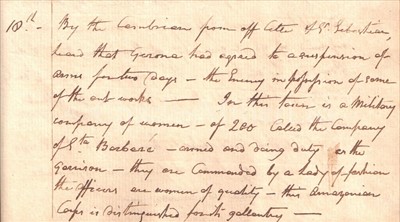31st Oct, 2012 12:00
Maritime and Scientific Models, Instruments & Art (Cochrane)
39
[M] A PRIVATE AUTOGRAPH JOURNAL KEPT BY ADMIRAL...
A PRIVATE AUTOGRAPH JOURNAL KEPT BY ADMIRAL LORD COLLINGWOOD (1750-1810) WHILST COMMANDING THE BRITISH FLEET IN THE MEDITERRANEAN DECEMBER 1807-JUNE 1810
approximately 45 pages of laid paper written in a hasty hand and comprising a sporadic sequence of memoranda and remarks describing operations, movement of ships, allies, enemies, navigational conditions etc.: Russian manoeuvres cause alarm: ..a letter from Capt. Harvey informing me that all the Russian vessels of war - Viz 4 Ships of the line, 3 frigates, 3 Corvettes etc. - had sailed from Corfu up the Adriatic on the 26th last - they passed near the English ships - had Russian colours up but showed no disposition to chase them. I suspect the French frigates have been escorted by the Russians.. ...No account yet of the French fleet - I shall therefore proceed of cape Sapienza for a few days and getting to advise of them return to the coast of Sicily.. (2/1/1808); later that year: A Portuguese boat from the Nilia Real, and brot.[sic] information that on the 13th July a numerous Body of Portuguese 7 Spaniards attacked the French at Lisbon - they continued the assault for 6 days.. (3/8/1808); continuing with similar content and ending with an interesting account of the Battle of the Roses: ..the Enemy is in possession of some of the end works - in this town is a Military company of women - of 260 called the Company of St. Barbara - armed and doing duty on the Garrison - they are Commanded by a Lady of fashion, the officers are women of quality - this [illegible] Corps is distinguished for its gallantry -- (10/12/1809), bound between original vellum boards inscribed on cover -- 7½ x 6½in. (19 x 16.5cm.)
Manuscripts by Collingwood are comparatively rare when considered in light of his great friend Nelson's phenomenal output. He was a succinct man who rarely used two words when one would do, which means that this little volume is packed with interesting detail and shows just what a fraught place the Mediterranean was at this date. Little wonder that Collingwood never set foot in Britain again after the Battle of Trafalgar - there was simply no let-up in the various intrigues arising from the continuing Wars with France and Spain, and Collingwood was occupied in important political and diplomatic transactions in the Mediterranean, in which he displayed tact and judgement. His health began to decline alarmingly in 1809 and he repeatedly requested the Admiralty to allow him to return home, which was finally granted. Collingwood died on board the Ville de Paris, off Port Mahon as he sailed for England, on 7 March 1810. He was laid to rest next to Nelson in the crypt of St Paul's Cathedral.
approximately 45 pages of laid paper written in a hasty hand and comprising a sporadic sequence of memoranda and remarks describing operations, movement of ships, allies, enemies, navigational conditions etc.: Russian manoeuvres cause alarm: ..a letter from Capt. Harvey informing me that all the Russian vessels of war - Viz 4 Ships of the line, 3 frigates, 3 Corvettes etc. - had sailed from Corfu up the Adriatic on the 26th last - they passed near the English ships - had Russian colours up but showed no disposition to chase them. I suspect the French frigates have been escorted by the Russians.. ...No account yet of the French fleet - I shall therefore proceed of cape Sapienza for a few days and getting to advise of them return to the coast of Sicily.. (2/1/1808); later that year: A Portuguese boat from the Nilia Real, and brot.[sic] information that on the 13th July a numerous Body of Portuguese 7 Spaniards attacked the French at Lisbon - they continued the assault for 6 days.. (3/8/1808); continuing with similar content and ending with an interesting account of the Battle of the Roses: ..the Enemy is in possession of some of the end works - in this town is a Military company of women - of 260 called the Company of St. Barbara - armed and doing duty on the Garrison - they are Commanded by a Lady of fashion, the officers are women of quality - this [illegible] Corps is distinguished for its gallantry -- (10/12/1809), bound between original vellum boards inscribed on cover -- 7½ x 6½in. (19 x 16.5cm.)
Manuscripts by Collingwood are comparatively rare when considered in light of his great friend Nelson's phenomenal output. He was a succinct man who rarely used two words when one would do, which means that this little volume is packed with interesting detail and shows just what a fraught place the Mediterranean was at this date. Little wonder that Collingwood never set foot in Britain again after the Battle of Trafalgar - there was simply no let-up in the various intrigues arising from the continuing Wars with France and Spain, and Collingwood was occupied in important political and diplomatic transactions in the Mediterranean, in which he displayed tact and judgement. His health began to decline alarmingly in 1809 and he repeatedly requested the Admiralty to allow him to return home, which was finally granted. Collingwood died on board the Ville de Paris, off Port Mahon as he sailed for England, on 7 March 1810. He was laid to rest next to Nelson in the crypt of St Paul's Cathedral.
Sold for £10,540
Estimated at £6,000 - £8,000
(inc. buyer's premium of 24%)
A PRIVATE AUTOGRAPH JOURNAL KEPT BY ADMIRAL LORD COLLINGWOOD (1750-1810) WHILST COMMANDING THE BRITISH FLEET IN THE MEDITERRANEAN DECEMBER 1807-JUNE 1810
approximately 45 pages of laid paper written in a hasty hand and comprising a sporadic sequence of memoranda and remarks describing operations, movement of ships, allies, enemies, navigational conditions etc.: Russian manoeuvres cause alarm: ..a letter from Capt. Harvey informing me that all the Russian vessels of war - Viz 4 Ships of the line, 3 frigates, 3 Corvettes etc. - had sailed from Corfu up the Adriatic on the 26th last - they passed near the English ships - had Russian colours up but showed no disposition to chase them. I suspect the French frigates have been escorted by the Russians.. ...No account yet of the French fleet - I shall therefore proceed of cape Sapienza for a few days and getting to advise of them return to the coast of Sicily.. (2/1/1808); later that year: A Portuguese boat from the Nilia Real, and brot.[sic] information that on the 13th July a numerous Body of Portuguese 7 Spaniards attacked the French at Lisbon - they continued the assault for 6 days.. (3/8/1808); continuing with similar content and ending with an interesting account of the Battle of the Roses: ..the Enemy is in possession of some of the end works - in this town is a Military company of women - of 260 called the Company of St. Barbara - armed and doing duty on the Garrison - they are Commanded by a Lady of fashion, the officers are women of quality - this [illegible] Corps is distinguished for its gallantry -- (10/12/1809), bound between original vellum boards inscribed on cover -- 7½ x 6½in. (19 x 16.5cm.)
Manuscripts by Collingwood are comparatively rare when considered in light of his great friend Nelson's phenomenal output. He was a succinct man who rarely used two words when one would do, which means that this little volume is packed with interesting detail and shows just what a fraught place the Mediterranean was at this date. Little wonder that Collingwood never set foot in Britain again after the Battle of Trafalgar - there was simply no let-up in the various intrigues arising from the continuing Wars with France and Spain, and Collingwood was occupied in important political and diplomatic transactions in the Mediterranean, in which he displayed tact and judgement. His health began to decline alarmingly in 1809 and he repeatedly requested the Admiralty to allow him to return home, which was finally granted. Collingwood died on board the Ville de Paris, off Port Mahon as he sailed for England, on 7 March 1810. He was laid to rest next to Nelson in the crypt of St Paul's Cathedral.
approximately 45 pages of laid paper written in a hasty hand and comprising a sporadic sequence of memoranda and remarks describing operations, movement of ships, allies, enemies, navigational conditions etc.: Russian manoeuvres cause alarm: ..a letter from Capt. Harvey informing me that all the Russian vessels of war - Viz 4 Ships of the line, 3 frigates, 3 Corvettes etc. - had sailed from Corfu up the Adriatic on the 26th last - they passed near the English ships - had Russian colours up but showed no disposition to chase them. I suspect the French frigates have been escorted by the Russians.. ...No account yet of the French fleet - I shall therefore proceed of cape Sapienza for a few days and getting to advise of them return to the coast of Sicily.. (2/1/1808); later that year: A Portuguese boat from the Nilia Real, and brot.[sic] information that on the 13th July a numerous Body of Portuguese 7 Spaniards attacked the French at Lisbon - they continued the assault for 6 days.. (3/8/1808); continuing with similar content and ending with an interesting account of the Battle of the Roses: ..the Enemy is in possession of some of the end works - in this town is a Military company of women - of 260 called the Company of St. Barbara - armed and doing duty on the Garrison - they are Commanded by a Lady of fashion, the officers are women of quality - this [illegible] Corps is distinguished for its gallantry -- (10/12/1809), bound between original vellum boards inscribed on cover -- 7½ x 6½in. (19 x 16.5cm.)
Manuscripts by Collingwood are comparatively rare when considered in light of his great friend Nelson's phenomenal output. He was a succinct man who rarely used two words when one would do, which means that this little volume is packed with interesting detail and shows just what a fraught place the Mediterranean was at this date. Little wonder that Collingwood never set foot in Britain again after the Battle of Trafalgar - there was simply no let-up in the various intrigues arising from the continuing Wars with France and Spain, and Collingwood was occupied in important political and diplomatic transactions in the Mediterranean, in which he displayed tact and judgement. His health began to decline alarmingly in 1809 and he repeatedly requested the Admiralty to allow him to return home, which was finally granted. Collingwood died on board the Ville de Paris, off Port Mahon as he sailed for England, on 7 March 1810. He was laid to rest next to Nelson in the crypt of St Paul's Cathedral.
Auction: Maritime and Scientific Models, Instruments & Art (Cochrane), 31st Oct, 2012
